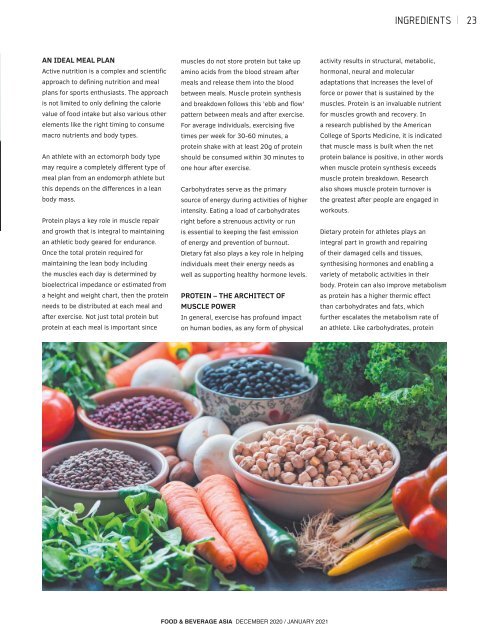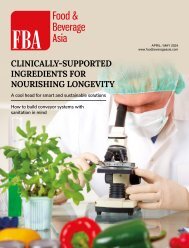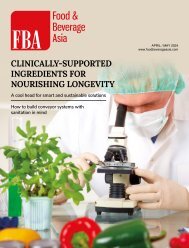Food & Beverage Asia December 2020/January 2021
Food & Beverage Asia (FBA) is the leading source of food and beverage news in Asia since 2002. FBA delivers a comprehensive view of the food and beverage landscape, spanning across the latest health and nutrition trends and industry innovations in ingredients, recipe formulations, food science, sustainability, packaging, and automation, as well as advancements in agri and food-tech.
Food & Beverage Asia (FBA) is the leading source of food and beverage news in Asia since 2002. FBA delivers a comprehensive view of the food and beverage landscape, spanning across the latest health and nutrition trends and industry innovations in ingredients, recipe formulations, food science, sustainability, packaging, and automation, as well as advancements in agri and food-tech.
- No tags were found...
You also want an ePaper? Increase the reach of your titles
YUMPU automatically turns print PDFs into web optimized ePapers that Google loves.
INGREDIENTS<br />
23<br />
AN IDEAL MEAL PLAN<br />
Active nutrition is a complex and scientific<br />
approach to defining nutrition and meal<br />
plans for sports enthusiasts. The approach<br />
is not limited to only defining the calorie<br />
value of food intake but also various other<br />
elements like the right timing to consume<br />
macro nutrients and body types.<br />
An athlete with an ectomorph body type<br />
may require a completely different type of<br />
meal plan from an endomorph athlete but<br />
this depends on the differences in a lean<br />
body mass.<br />
Protein plays a key role in muscle repair<br />
and growth that is integral to maintaining<br />
an athletic body geared for endurance.<br />
Once the total protein required for<br />
maintaining the lean body including<br />
the muscles each day is determined by<br />
bioelectrical impedance or estimated from<br />
a height and weight chart, then the protein<br />
needs to be distributed at each meal and<br />
after exercise. Not just total protein but<br />
protein at each meal is important since<br />
muscles do not store protein but take up<br />
amino acids from the blood stream after<br />
meals and release them into the blood<br />
between meals. Muscle protein synthesis<br />
and breakdown follows this 'ebb and flow'<br />
pattern between meals and after exercise.<br />
For average individuals, exercising five<br />
times per week for 30-60 minutes, a<br />
protein shake with at least 20g of protein<br />
should be consumed within 30 minutes to<br />
one hour after exercise.<br />
Carbohydrates serve as the primary<br />
source of energy during activities of higher<br />
intensity. Eating a load of carbohydrates<br />
right before a strenuous activity or run<br />
is essential to keeping the fast emission<br />
of energy and prevention of burnout.<br />
Dietary fat also plays a key role in helping<br />
individuals meet their energy needs as<br />
well as supporting healthy hormone levels.<br />
PROTEIN – THE ARCHITECT OF<br />
MUSCLE POWER<br />
In general, exercise has profound impact<br />
on human bodies, as any form of physical<br />
activity results in structural, metabolic,<br />
hormonal, neural and molecular<br />
adaptations that increases the level of<br />
force or power that is sustained by the<br />
muscles. Protein is an invaluable nutrient<br />
for muscles growth and recovery. In<br />
a research published by the American<br />
College of Sports Medicine, it is indicated<br />
that muscle mass is built when the net<br />
protein balance is positive, in other words<br />
when muscle protein synthesis exceeds<br />
muscle protein breakdown. Research<br />
also shows muscle protein turnover is<br />
the greatest after people are engaged in<br />
workouts.<br />
Dietary protein for athletes plays an<br />
integral part in growth and repairing<br />
of their damaged cells and tissues,<br />
synthesising hormones and enabling a<br />
variety of metabolic activities in their<br />
body. Protein can also improve metabolism<br />
as protein has a higher thermic effect<br />
than carbohydrates and fats, which<br />
further escalates the metabolism rate of<br />
an athlete. Like carbohydrates, protein<br />
FOOD & BEVERAGE ASIA DECEMBER <strong>2020</strong> / JANUARY <strong>2021</strong>


















